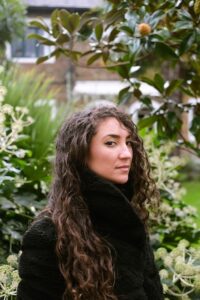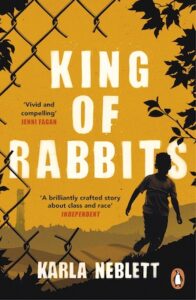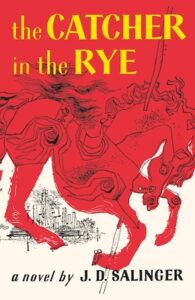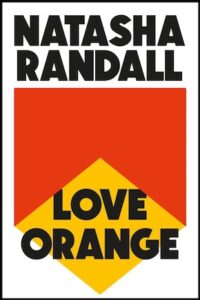Karla Neblett: Angry love
by Mark ReynoldsKarla Neblett’s hugely impressive debut novel King of Rabbits is a vividly realised story about a resourceful, sensitive and imaginative boy from a mixed-race, blended family on a Somerset council estate. Kai’s mum is transitioning from heavy drinking to addiction to crack cocaine, which she is led into by his father, who feeds his own voracious drug habit by petty theft. Kai is also buoyed by love and friendship and the lure of nature, but everything is stacked against him. It’s a novel drawn from Karla’s tender and acute perception of the people she was surrounded by growing up, and her subsequent work with troubled children and teenagers, and pulls no punches about the persistent perils in disadvantaged communities of becoming overwhelmed by money worries, substance abuse and thoughts of ending it all.
Mark: What did you set out to depict about Kai’s upbringing and the failings of British society, and specifically in the area where you grew up?
Karla: It was my intention to show that parents who have addictions love their children. I hate it when people say things like, “If they loved their kids they’d stop.” Addiction doesn’t work that way.
It was important for me to reveal the repetitiveness of a parent making promises to stop taking the substance because, truly, they often want to, but ultimately addiction is a disease of control. I see it as a type of possession… like a parasite has come in and is controlling thoughts and behaviours.
The thing I was interested in showing the most was how parental behaviours impact a child’s outcome. As much as a parent with an addiction loves their child, their child is going through the life-altering damage of feeling lied to, rejected, hurt. I wanted to show both sides; the experiences of both parent and child.
I’m angry about a lot of things. One of which is how children and teenagers are judged. Often in schools. In the community. In society. I’m furious that a child’s opportunities and chances of social mobility are negatively impacted from the get-go, due to their socio-economic background.
The system is failing children all over the country. In cities, in the countryside. I wrote situations that were familiar to me because Joyce Carol Oates says to “write what you know.” I wanted to show how schools, communities and society let children down. I don’t always feel comfortable saying these things explicitly, though. They’re controversial and I’m no good at debating. I’m not articulate when I feel things deeply, which is why it’s easier to say it through art. This is why fiction and the arts are critical. To force people to look at things that are hard to look at and to make people think, “this needs to change and I want to be a part of a new dialogue.”
You tell the story in two timeframes: in the mid-1990s when Kai is five and six; and the winter of 2005 when he is fifteen. Why did you pick those years, and how might the story differ if Kai had reached fifteen in the present day?
What can I say? It’s easy to write the things you know. Writing a debut novel is hard enough; I had no idea what I was doing when I started out and so it made sense to keep it simple where it was easy to do so. I would be six years older than Kai if he were real and alive. I guess returning to 1996 and 2005 was nostalgic in part, but mainly I couldn’t be bothered to include all the new technology and learn new slang.
I feel sorry for young people having to grow up now. Social media is so damaging. Anxiety and self-harming seemed to be massively increasing amongst teenagers during my last few years working with them. Now, with the pandemic, and everything coming to a stop?
I really feel for them. How would things be different for Kai? He’d be enjoying the time off school, but ultimately everything would be worse. Especially with the past eleven years living under austerity. His mum would be very grateful to Marcus Rashford’s free school meals campaign.
Fiction and the arts are critical. To force people to look at things that are hard to look at and to make people think, ‘this needs to change and I want to be a part of a new dialogue.’”
The early episodes are told in third-person, while the fifteen-year-old Kai narrates the later sections, giving him more agency, but not necessarily any more control over events. Why did you choose to distinguish the two periods in this way?
Using third person when Kai is five was a way of showing Kai from a more ‘external’ point of view. I wanted it to feel like things were happening around and outside of him. It was also to create the feeling of memory by putting some distance between the past and present Kai.
Kai at fifteen had to be written in first person because I wanted the reader to have no doubt of the state of his mental health and how torturous living felt for him. I wanted to make it very clear why he made the decision he did and I wanted readers to read ‘I’ so that they were in his shoes. I hoped this would make people think more before judging those who might be similar to him.
You’ve said you wanted to write a book that your brothers and father could pick up and read, that truly represents your shared experience. At what point did you share the work-in-progress with family and friends, and what kinds of reactions did you get?
I’ve been very scared to show anyone King of Rabbits. However, there were two times I shared the first two chapters of the work-in-progress.
Once to my friend, Charlotte. I regretted saying I would send it to her, but she kept asking for it. So I sent it and was terrified, but she liked it and I felt very emotional thinking someone could like it. The other time I read the first two chapters to my dad because I was starting to accept that he probably wouldn’t see the day it might be published. I just read and he listened. He was a man of few words when it came to emotional things, but when I stopped reading he grabbed me and hugged me and so I knew I had done well and that no other reaction would ever mean more.
Does Kai at fifteen also represent an ideal reader for the book? It’s crossover YA – in the same way that could be said for Catcher in the Rye, for instance, which has been many teenagers’ first brush with literature for generations…
I wrote the book imagining a boy like Kai picking it up. It had to feel authentic. The written language had to be simple. Did you notice Kai is dyslexic? No one in his life notices this. I always knew I wanted it to be made into an audiobook for this reason, thinking “How would Kai find it easiest to read?” I spent the entire time writing it worried that I would write something boring because a boy ‘like Kai’ wouldn’t want to read a book, let alone a boring one and so I kept asking myself how to keep him interested.
In a way Kai represents the ideal reader, but only because I’d want him to know that he’s worthy of being written about and he is seen and someone cares. I understand that actually boys like Kai might find it hard to read situations that are familiar in this way.
People are always recommending books and TV to me that are about working-class people who are on benefits, for instance. People recommend things to me they think I’ll be interested in due to my socio-economic background. The truth is, as great and important as these books are, I like to read things that feel far away so that I can go somewhere else and learn and feel new things. There’s a big difference, though, between what I like to read and what I feel I must write.
For me, the other ideal readers are teenagers who come from a different background to Kai, teachers, community leaders and workers, and politicians. I think all politicians should have to read a set book list every couple of months decided on by book reviewers to keep their minds open to other types of lives.
The Catcher in the Rye is my all-time favourite book. Incidentally, it was one of the books I picked apart when I was writing King of Rabbits. I wanted to figure out what techniques Salinger used to portray negatively spiralling teenage mental health.
I am ticking this ‘BAME writer’ box for people, which I find irritating. I dislike being pigeonholed in terms of my writing because the arts should be a space for liberation and exploration where anything is possible.”
Kai retreats into nature, hanging around the school garden with Saffie, and building a den in the woods as his secret refuge, where he watches over the wild rabbits. Were nature and animals an escape for you too, growing up?
No. I’ve never been outdoorsy, although I’ve always been aware of and appreciated the countryside around me. I had to learn a lot about trees to write this book!
Do you identify as a BAME writer? What do you consider to be that label’s limitations?
I am mixed-race and I am a writer. I am ticking this ‘BAME writer’ box for people, which I find irritating. I hate this BAME label. I haven’t thought about why yet, but I know it’s another thing that makes me angry. I have to build up to thinking about things that emotionally affect me because I say and do things I regret and when I speak from an emotional place I am incredibly inarticulate.
I will say this, though, I dislike being pigeonholed in terms of my writing because the arts should be a space for liberation and exploration where anything is possible.
Your first degree is in Psychology, and you’ve worked to support children with learning and behavioural issues, who misuse alcohol and other substances, or are carers in their family, as well as with school-leavers on the jobs scrapheap. How have the degree and those work experiences informed your fiction writing?
I guess the degree enabled me to think about why people think and act the way they do, although I’m sure working with young people would have enabled me to think about that without the student debt. Perhaps with the degree I consider the neurological and cognitive aspects of behaviours a little bit…
Working with teenagers has been one of the most special things in my life. When a child or young person opens up to you, it is a real-life treasure. Also, you learn so much about yourself, other people, and how to look at the world by cherishing their youthful wisdom. Theirs is a clearer way of seeing life.
When I worked in schools I always found it so strange that it was part of my job to tell kids they needed to put their tie on, because for me the important thing was that the child had made it to school. If one of the kids would say, “But how does wearing a tie affect my learning?” I would always internally agree that it didn’t. Hence, I wasn’t built for working in schools and veered towards working with young people in other organisations. Things like this definitely influenced the shape of Kai.
There were many, many people who Kai is ‘of’ and so it was like a collective feeling of the impression I’ve been left with that brought me to his character. It feels strange to call him a character because to me he feels very real and I know there are many young lads like him out there.
I really hope I did the ‘spirit’ of children and young people justice.
Had you begun plotting King of Rabbits before taking up the Creative Writing MA, or did it only take shape on the course?
I started writing King of Rabbits in the second term of the MA. There was no plot and the first draft was an absolute joke. I cringe to think of it. All I knew for certain was the beginning and end. I didn’t plot it until after a meeting with Hellie Ogden from Janklow & Nesbit who quite rightly, and thankfully, told me that the book had no plot and it needed rewriting! She gave me a few pointers and so I actually plotted it after the MA on one sunny afternoon in my friend Jane’s caravan in Woolacombe while she was off at work.
How long did it take you to complete the book from its earliest drafts, and what were some of the breakthrough moments, up to and including winning the Janklow & Nesbit Prize and securing an agent?
It took three years and five drafts and then another six months of editing. It drove me crazy, but I loved Kai and the urge to get his story out into the world was powerful.
Winning the J&N prize was a shock. I never thought I stood a chance. In fact, I wasn’t even going to enter until I was told to. It was the first moment that I thought to myself, “maybe I can actually write.” The truth is that everyone kept saying I had this thing called ‘voice’, but I realise in hindsight that I didn’t have much control over my writing and that was something I was about to start learning; the difference between creation and control and how important it is for them to come together harmoniously.
It’s hard to answer because I’m not entirely sure what ‘breakthrough moments’ is supposed to mean. Did I suddenly realise something? Never suddenly. Learning to write is a long, slow, solitary process.
I had been with my dad, looking after him, for a long time and so suddenly I was able to notice the sunshine, hear the birds and feel a release of the fear of the worst thing happening because it had already happened”
You lost your dad shortly before Covid came to dominate all our lives. How did you and your family manage to support each other through the first lockdown?
When someone you love so deeply dies, you want the world to stop. Covid made the world stop. I was able to be still and quiet and didn’t feel guilty about not doing anything. I had been with my dad, looking after him, for a long time and so suddenly I was able to notice the sunshine, hear the birds and feel a release of the fear of the worst thing happening because it had already happened. I experienced the strangeness of grief within a time where the world itself had become strange. It wasn’t uncomfortable.
My youngest brother Israel and I spent the first lockdown together at our dad’s. The pandemic was and is a scary thing, but after losing dad I wasn’t experiencing things the same way. I got a bit obsessive about sanitising for a few weeks but there was no fear. We spent our time very gently and allowed ourselves the space to grieve and talk about dad. Looking back, it was a unique and special moment.
How would you summarise your lockdown experience to date? And what are you most looking forward to once it finally lifts?
Naturally I veer towards being slightly ‘hermit’ in nature. Compared to many people I know who have really struggled, I’ve been very lucky. A quiet life is something I enjoy so I just read, work, listen to and misunderstand French radio, the usual.
As soon as lockdown lifts I’m going to The White Hart pub which is the best pub in Midsomer Norton. I’m going to sit there with a pint of Thatcher’s, reading. That has been the thing I’ve missed most: reading and writing in local pubs.
How much of a reader were you as a kid, and which authors first switched you on to reading and made you want to write?
Until I hit GCSEs and it became a chore, I loved reading. It was my favourite way to pass time. When I was diddy, I loved Enid Blyton’s The Magic Faraway Tree series, and when I got a little older it was Nancy Drew. I didn’t read much then until I was crawling out the end of the existential crisis that was my twenties. I won’t name the book, but I was reading a bestseller around that time and thought to myself, “If this person has written a book then I can because this writing is sh*t.” Until that point I’d lived under the misconception that you had to be highly intelligent with a story worth telling to write a book and get published.
Who do you count among your favourite authors today, and why?
My university lecturer Gavin introduced me to Joyce Carol Oates and I’ve been raving about her ever since. It’s her style and technique, they’re masterful. Her writing is sharp, clean, and the pacing, damn, her pacing!!! On top of that she writes fiction influenced by terrible things that have actually happened. She’s fearless, a true artist, and often draws the story of victims to the forefront. She’s a literary genius.
Which books have you read most recently that you would particularly recommend?
Slaughterhouse-Five by Kurt Vonnegut. It’s trippy, fun, poignant.
Love Orange by Natasha Randall. It’s smart, nuanced, and I can still taste the orange glue.
What will you be reading next?
Such a Fun Age by Kiley Reid.
The Cauliflower by Nicola Barker.
The Age of Reason by Jean-Paul Sartre.
You are partway through your second novel. What’s it about?
The bizarreness of grief, but not in the way you’d assume. It’s about a strange woman who’s an embalmer. Her father has died and she’s finding it mentally and physically hard to let him go. There’s a second narrative where you go back in time and discover how she was lured and trapped by a creepy embalmer guy in his chateau. You find out how the protagonist made her career choice and what leads her to deciding she’s going to get revenge on the creepy guy.
It’s about how trauma can make you do strange things. It’s surreal in places because deep grief is. Now I can see that it has a touch of Dracula – my dad and I loved to watch the film together, so my subconscious has clearly been hard at work again.
It was very important for me to write about death and grief. When my dad was ill and as he was dying, I was shocked by how uncomfortable British people are when it comes to talking about and dealing with death. I’m a communicator. There’s strength to be gained by facing things head on. For me, there’s power in saying the awful things you think out loud – recognising and reflecting on how dark the mind can become. This book is a way of showing that actually it’s natural when you’re facing something traumatic.
This work is both my requiem to my dad and a story that forces a person to look at death with the hope that they can feel braver about facing it when life brings it to someone they love.
I like to write through an emotional sense of being overwhelmed by the imagined world to the point it erupts through my fingertips.”
When you were turned down for an Arts Council grant last December, you tweeted, “Back to the real world. Novel writing, it’s been a blast.” Are things looking up since then? Have you been able to make some progress on book two, or is it on a hiatus while you launch King of Rabbits?
I don’t have time to work on my second novel. I work as a content writer now which is great but it means that I am too mentally exhausted at the end of the day to write creatively. It uses the same head space.
Also, when I write creatively it’s an incredibly immersive act. It takes a huge amount of physical and mental space for me to inhabit the world and be able to translate that to the page. I can try and sit down on a Thursday evening to work on my novel, but the world, characters, voices just aren’t there the way they are when I have the time to immerse. I like to write through an emotional sense of being overwhelmed by the imagined world to the point it erupts through my fingertips, which is something that doesn’t happen when I’ve not had time to be ‘in’ it.
What have been the stand-out moments between signing your book deal and holding a finished copy in your hands?
Whispering to my dad on his deathbed that it was happening and I’d put his name in the front of it. In response, he squeezed my hand.
Opening the book and seeing his name and thinking, “There will be houses all over England with a book with my dad’s name in it.” That was a special thought, like he isn’t as invisible as death has made him.
What are your hopes for the immediate and longer-term future?
To keep earning enough money content-writing to pay rent and save up for a holiday! To get more writing clients. For King of Rabbits to do well. To one day have time to finish the second book and find someone brave enough to publish its bizarre flavour. To write my third book, which I’ve had in my head since the same week I started King of Rabbits – it’s going to need a lot of research.
 Karla Neblett is a novelist and content writer based in Somerset. She has a degree in Psychology from the University of the West of England and an MA in Creative Writing from Bath Spa University, where she won the Janklow & Nesbit Prize. King of Rabbits is out now in paperback from Penguin, and as an eBook and audio download from Cornerstone Digital.
Karla Neblett is a novelist and content writer based in Somerset. She has a degree in Psychology from the University of the West of England and an MA in Creative Writing from Bath Spa University, where she won the Janklow & Nesbit Prize. King of Rabbits is out now in paperback from Penguin, and as an eBook and audio download from Cornerstone Digital.
Read more
karlaneblett.com
karlaneblett
@KarlaNeblett
Author portrait © Sophie Davidson
Mark Reynolds is a freelance editor and writer, and a founding editor of Bookanista.
@bookanista
wearebookanista
bookanista.com/author/mark




